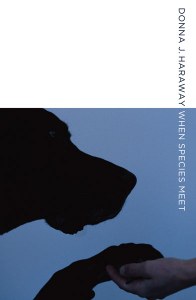Gustave Blåbær (e)k Donna J. Haraway(r)en When Species Meet (Posthumanities) liburuaren kritika egin du
Review of 'When Species Meet (Posthumanities)' on 'Goodreads'
2 izar
J'ai pas accroché tbh

Paperback, 360 orrialde
English hizkuntza
2007ko aza. 26a(e)an Univ Of Minnesota Press(e)n argitaratua.
Whom do we touch when we touch a dog? How does this touch shape our multispecies world?
In 2006, about 69 million U.S. households had pets, giving homes to around 73.9 million dogs, 90.5 million cats, and 16.6 million birds, and spending more than 38 billion dollars on companion animals. As never before in history, our pets are truly members of the family. But the notion of “companion species”—knotted from human beings, animals and other organisms, landscapes, and technologies—includes much more than “companion animals.” In When Species Meet, Donna J. Haraway digs into this larger phenomenon to contemplate the interactions of humans with many kinds of critters, especially with those called domestic. At the heart of the book are her experiences in agility training with her dogs Cayenne and Roland, but Haraway’s vision here also encompasses wolves, chickens, cats, baboons, sheep, microorganisms, and whales wearing video cameras. From designer pets …
Whom do we touch when we touch a dog? How does this touch shape our multispecies world?
In 2006, about 69 million U.S. households had pets, giving homes to around 73.9 million dogs, 90.5 million cats, and 16.6 million birds, and spending more than 38 billion dollars on companion animals. As never before in history, our pets are truly members of the family. But the notion of “companion species”—knotted from human beings, animals and other organisms, landscapes, and technologies—includes much more than “companion animals.” In When Species Meet, Donna J. Haraway digs into this larger phenomenon to contemplate the interactions of humans with many kinds of critters, especially with those called domestic. At the heart of the book are her experiences in agility training with her dogs Cayenne and Roland, but Haraway’s vision here also encompasses wolves, chickens, cats, baboons, sheep, microorganisms, and whales wearing video cameras. From designer pets to lab animals to trained therapy dogs, she deftly explores philosophical, cultural, and biological aspects of animal–human encounters. In this deeply personal yet intellectually groundbreaking work, Haraway develops the idea of companion species, those who meet and break bread together but not without some indigestion. “A great deal is at stake in such meetings,” she writes, “and outcomes are not guaranteed. There is no assured happy or unhappy ending-socially, ecologically, or scientifically. There is only the chance for getting on together with some grace.” Ultimately, she finds that respect, curiosity, and knowledge spring from animal–human associations and work powerfully against ideas about human exceptionalism.
J'ai pas accroché tbh